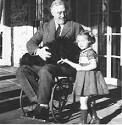"Trump would be the healthiest president ever," bloviated his doctor Harold Bornstein.I say, so what?
Let's examine five not-so-healthy presidents: Abraham Lincoln, Theodore Roosevelt, Franklin Delano Roosevelt, Dwight D. Eisenhower, and John F. Kennedy. In aggregate and alphabetical order, some of their medical conditions include:
Addison's disease, chronic asthma, chronic back pain, heart condition, Marfan's syndrome, and polio.
Of the five, three died in office which seems to buttress the argument that one has to have a 100% healthy candidate. Let's look closer. Two were assassinated (had nothing to do with their health), one lived 8 years beyond his presidency, another 10 years after he left office. One did die in office but not until his fourth term.
Being in not-so-great health did not seem to preclude these men serving their country well. Let's recap some highlights from the presidencies of these less than100% healthy men.
Lincoln—soul stirring rhetoric, long range vision, innovative executive management techniques. He's simply the best—literally. Lincoln is almost always #1 in any poll. And he had a sick wife to boot!
Teddy Roosevelt—We may picture him brandishing his big stick, but he began life as a sickly child felled frequently by asthma. He was sent west to the Badlands, led a vigorous life, and his presidency reflected his appreciation for the healing powers of an outdoors life with the creation of the National Park System. As the proponent of a Square Deal for all, his record of Progressive legislation includes laws that safeguarded the health of all Americans –the Pure Food and Drug Act and the Meat Inspection Act.
Franklin Delano Roosevelt. FDR began life as a healthy person and contracted polio in his 20s. Although rarely photographed looking disabled, he couldn't walk. Ambulating did not seem to be a prerequisite for leading the US through two of its greatest crises:The Great Depression and World War II. His strength may not have been physical but because of his strength of purpose relayed through radio and newsreel, many Americans forgot their president was a "cripple."
Dwight D. Eisenhower has been moving up on the top ten list of best presidents as historians revisit his two terms. In times of great civil unrest—the McCarthy era and the Civil Rights struggle, he stood up for freedom of speech and freedom for all. Even with his bad heart he was able to keep the conflict with Russia a cold war and not a heated battle.
John F. Kennedy. New books about Kennedy are replete with medical details about the lingering effects of his World War II injuries and his chronic Addison's disease. Newspapers of his era spoke of JFK's "vigor" and the youth and energy he brought to the White House. Despite pain, he showed a sure hand during one of the most serious moments of the twentieth century—the Cuban Missile Crisis.
To recap for those who revel in lists, 162 members of the American Political Science Associations' Presidents and Executive Politics Section rank ordered former presidents of the US for Presidents' Day 2016. My selective list of less-than-healthy presidents fared well.
Abraham Lincoln #1
Franklin Delano Roosevelt #2
Theodore Roosevelt #4
Dwight D. Eisenhower #7
John F. Kennedy #14
Perhaps being 100% healthy is not an advantage for a president. Consider that knowing illness and limitation can build inner strength and resilience. Living with a keen awareness of one's mortality and with pain might increase empathy for others and a sense of urgency to action.
Good health is partially due to our good habits so let's be wary of claiming credit for our own longevity or "perfect" health. Rational people understand good health also depends on our genetic heritage, our environment, our access to health care, and our good luck. It is not the sine qua non for a great president.





